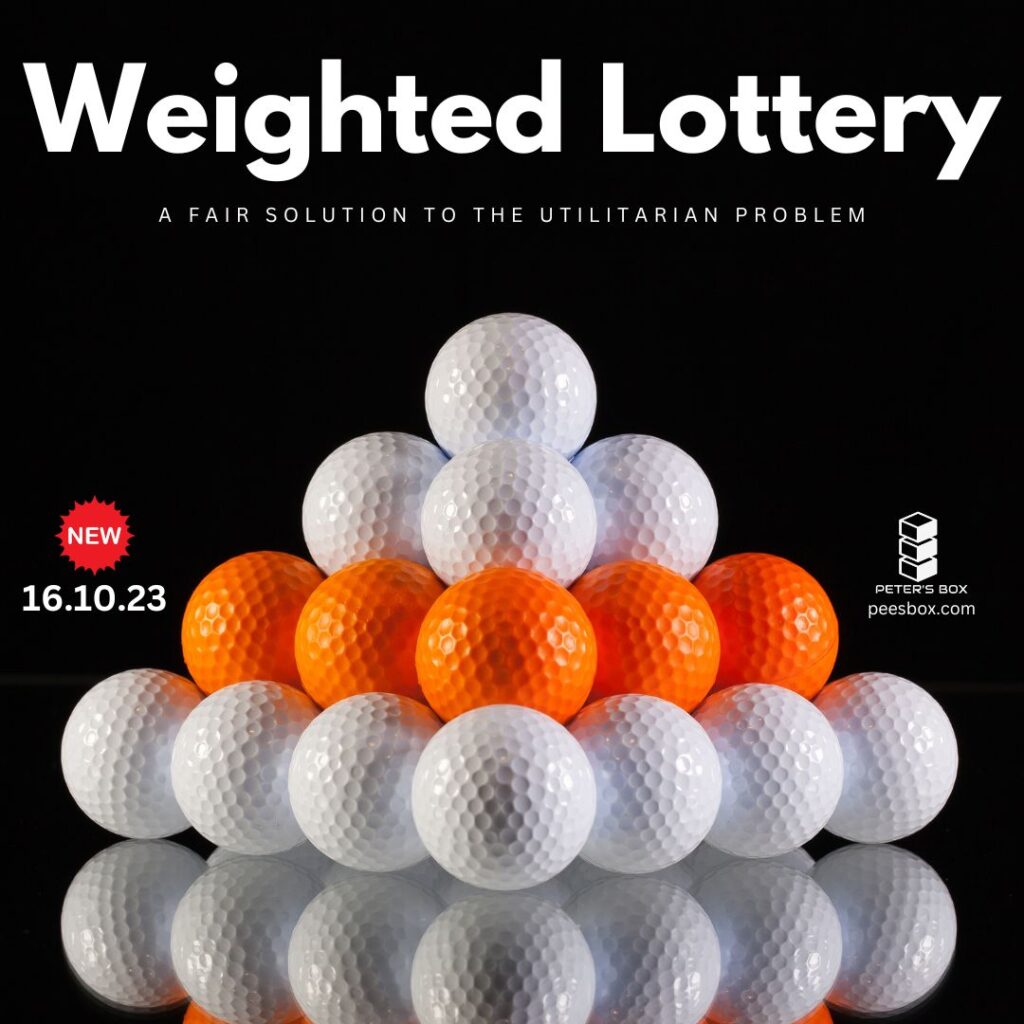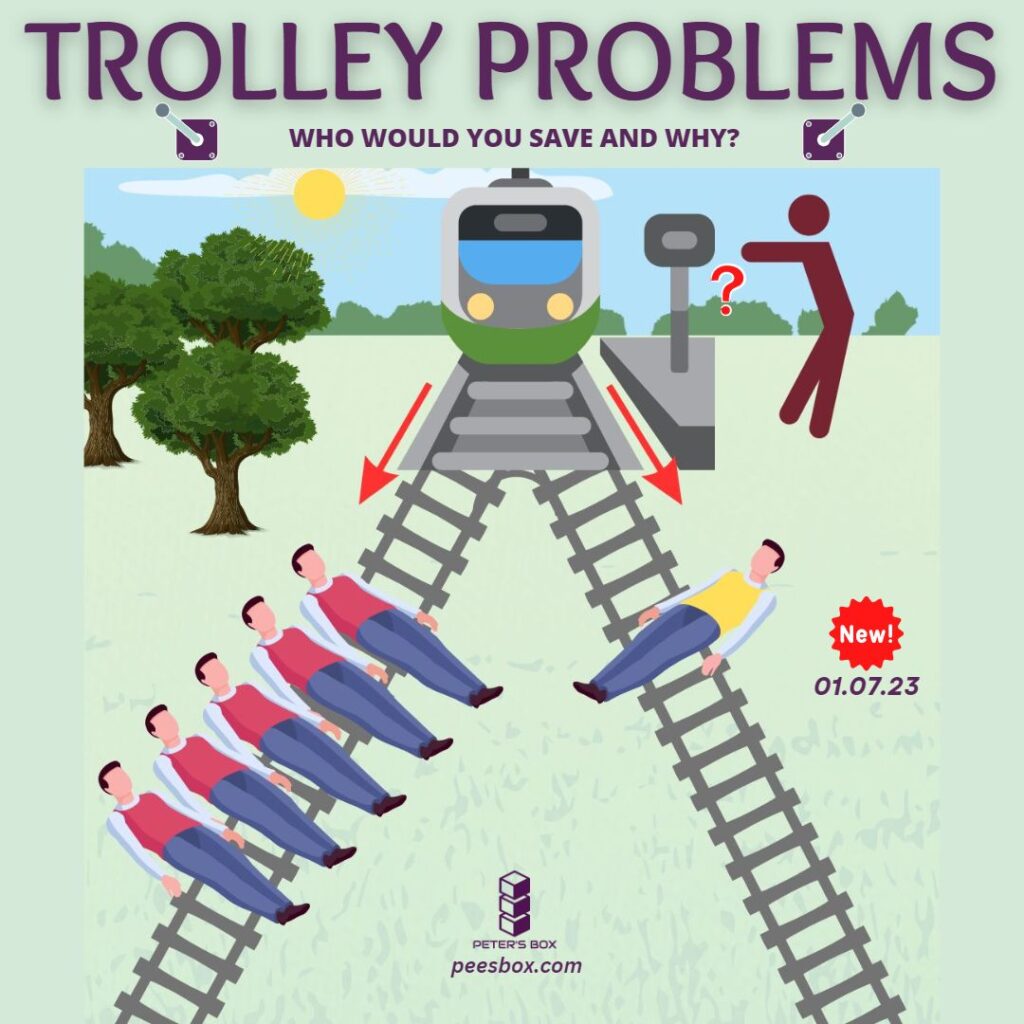The weighted lottery is a solution to a fundamental utilitarian problem. When you are in a scenario where you are in the minority and utilitarianism is being used to determine what moral action to take, the flaw in utilitarianism becomes extremely obvious. According to utilitarianism, the correct or moral action to perform is one that results in the greatest good for the greatest number of people. As long as you are not on the minority’s side, it seems reasonable enough. However, if you are in the minority, there is little possibility that you will be the recipient of a moral act that will benefit you. The explanation is that for an action to be moral, the greatest good must be experienced by the largest number of people. Utilitarianism favours the majority in every scenario where there is a minority and a majority.
Basketball or Football?
Let’s take the following example into consideration so you can see why this is a problem:
On Saturday morning, you’re going to play sports with five friends. You must all decide whether to play football or basketball on Saturday. Everyone should have equal input in the ultimate choice, for fairness’ sake. However, due to the different options available, you must resort to a decision-making procedure. You all agree to cast votes to help decide which sport to play. You have second thoughts about the outcome of the voting. Your preferred sport is basketball, whereas your five friends prefer football. Even if you choose basketball, the votes of your five friends would undoubtedly outnumber yours.

That’s what utilitarianism feels like for the minority. The minority is automatically excluded. The majority has the advantage. Your friend offers another, fairer alternative. Instead of voting, why don’t you all agree to play basketball on Saturday and football the next Saturday? It appears that everyone is happy with this arrangement. At the very least, everyone’s preference is considered. This form of resolution could be effective in mundane, daily situations, but not in grave moral dilemmas. Of course, you would want some moral consideration if you were a minority.
Weighted Lottery Solution
How can you assure fairness for the minority while upholding the notion of utility in moral dilemmas? How can you practice utilitarianism while still considering the minority? You do it by using a weighted lottery!
A weighted lottery is an activity that provides each individual in a group with an equal opportunity to be included in the final outcome of a decision. To do this, the group members are represented by a placeholder. For instance, each member of a group may be represented by a ball. The placeholder is the ball. Placeholders represent an object of interest, in this case, individuals. Any object can be used as a placeholder, but it’s crucial that they all have a similar size and weight. A placeholder might be something like a piece of cardboard that is 2 × 2 cm. If you use a ball as a placeholder, make sure all of the balls are the same size and weight. Then, to differentiate one individual from another, each placeholder that represents that individual is marked uniquely. The mark might be a colour or a number.
Two Burning Buildings
You work as a firefighter in your town. In the town, there is just one firetruck. One fateful afternoon, you receive a distress call from a man who is trapped inside a burning building. Before you sound the alarm to alert your fire team to set out to rescue this man, you receive another distress call. A mother and her four children are trapped in their burning home. Your calculations indicate that the distance between the man in the other burning building and the woman and her four children is around four hours by road. There is sufficient water in the tank to extinguish the fire at both locations. However, even with enough water, you would not be able to get to the other burning building on time. It is too far away.

You immediately notify your supervisor, who happens to be a utilitarian. According to him, the right action to take is the action that causes the greatest good for the greatest number of people. As a result, he orders you to rescue the mother and her children. You point out to him that doing so would be unfair to the other man. You explain to your supervisor that the man’s life is significant and worthy of consideration. Your supervisor looks at you closely and asks, “You want to save one person and let five people die?”
Weighted Lottery Solution
You: No, sir. I mean, it is unfair that the man be ignored without giving him any thought just because he finds himself on the side of the minority.
Supervisor: What do you recommend we do now?
You: How about a weighted lottery? A weighted lottery ensures that everyone is fairly represented in the final choice.
Supervisor: Tell us how to carry it out.
You: Let’s get six balls. One represents the man. One represents the mother, while the other four are her four children. Each life is morally considered.
Supervisor: How can we tell which ball represents which person?
You: Let’s paint one of the balls blue. This blue ball represents the man. The other five balls can be coloured red. The five red balls represent the mother and her four children.
Supervisor: What happens next?
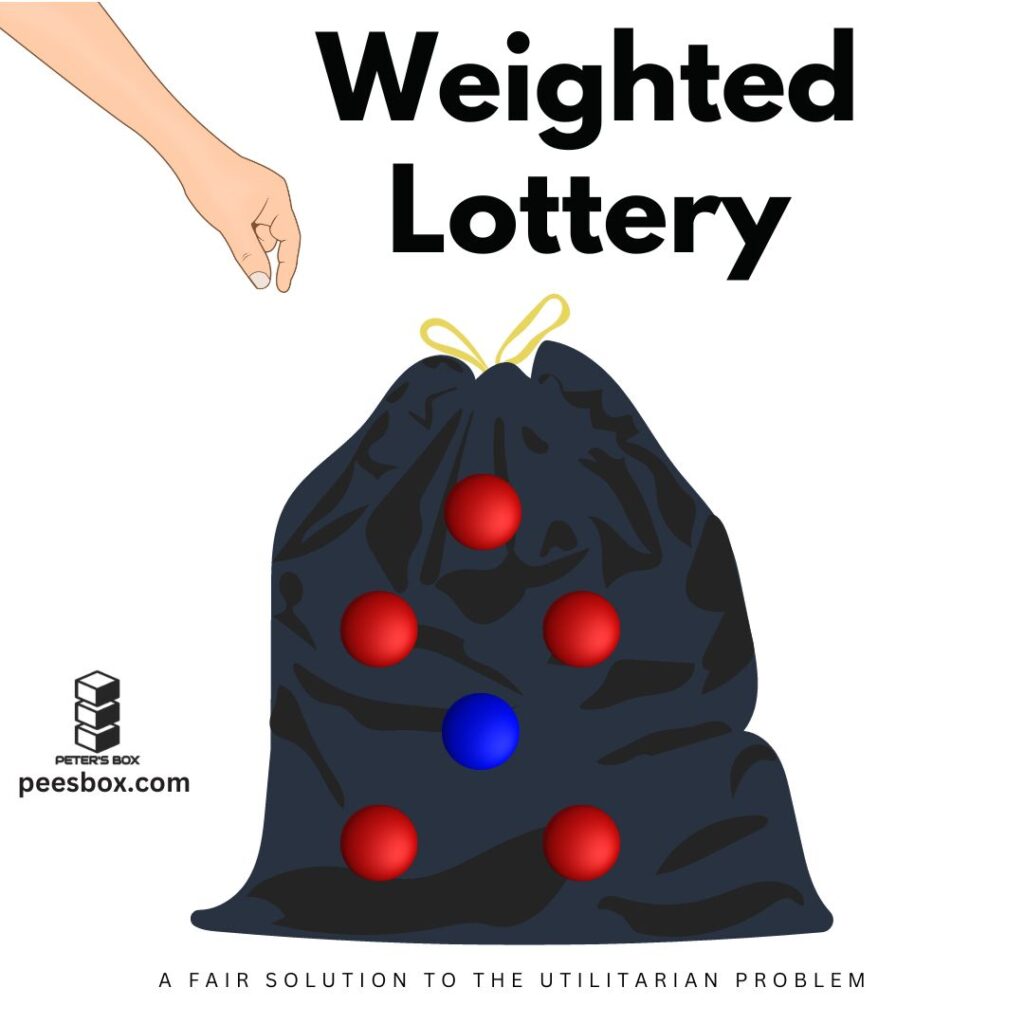
Weighted Lottery Steps
You: All six balls will be placed in a black bag. Take one ball out of the bag with your hand without peeking inside. The ball you remove will decide who we should rescue. If you select a blue ball, we will go rescue the man. We’ll go to the building where the mother and kids are if you choose the red ball.
Supervisor: Where are we going to get these six balls? Time is not on our side.
You: Go get me a piece of paper. It will be divided into six equal pieces. I’ll assign a number to each piece. Let the number 1 represent the man. The mother gets two. 3, 4, 5, and 6 are for children. The numbered papers will then be placed in a black bag. It works in the same way as a weighted lottery. You will dip your hand into the bag and choose one piece of paper.
Supervisor: I know the next step. If I pick a piece of paper, the number written on it will determine the person to be rescued. That is, if I choose a piece of paper with the number 3, representing one of the four children, we will go to the building with the mother and children. We will go to the building where the man is, though, if I choose a piece of paper with the number 1, which represents the man.
You: Exactly. Sir, you may now choose a paper from the bag.
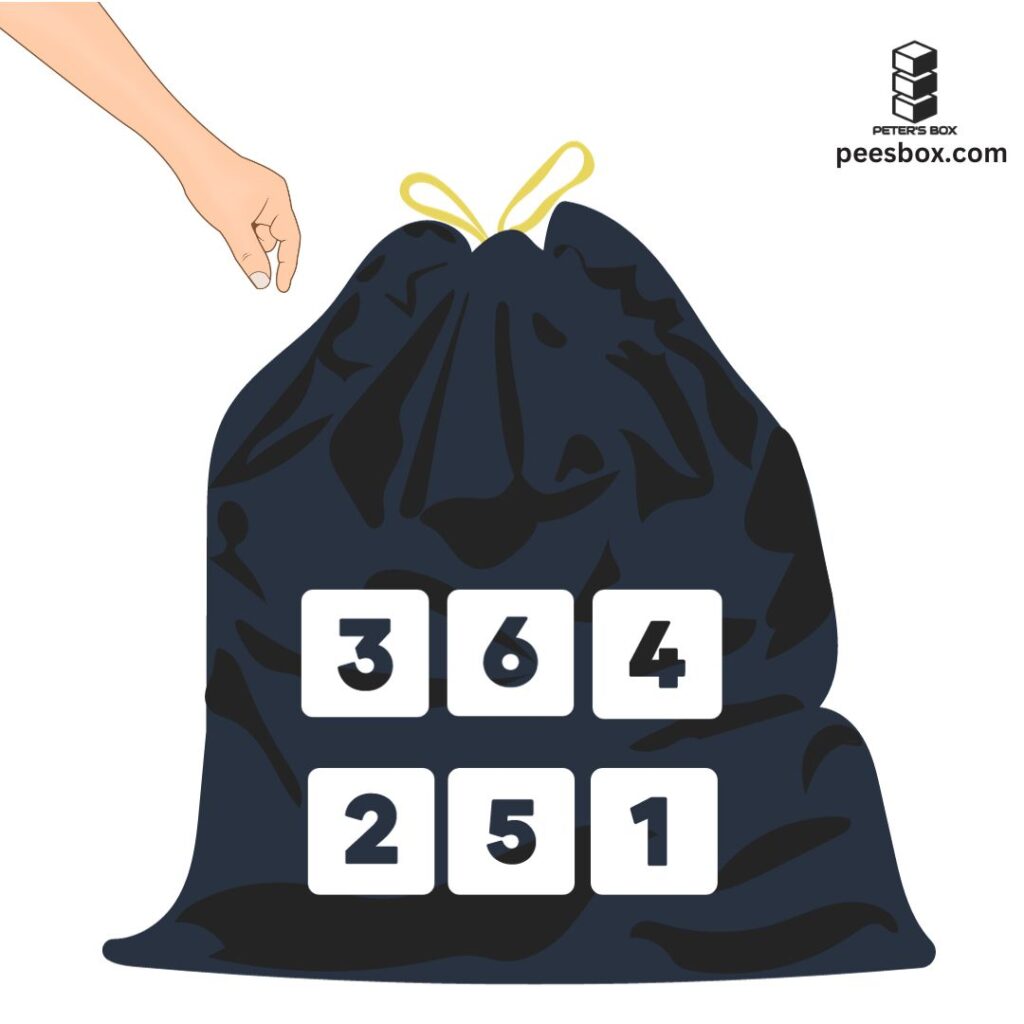
The Supervisor's Pick
With the weighted lottery, it seems that the minority has been given fair consideration in a utilitarian situation. Because the right action in utilitarianism is the action that generates the greatest good for the greatest number, the minority always loses out. However, a weighted lottery ensures that the minority would benefit from the right action that would have otherwise been bestowed by default on the majority.
Your supervisor goes ahead and pulls a paper from the bag. The number on the piece of paper he chose is 1. Since he chose paper number 1, you must save the man and abandon the mother and her children. Your boss, on the other hand, does not appear to be pleased with his selection.
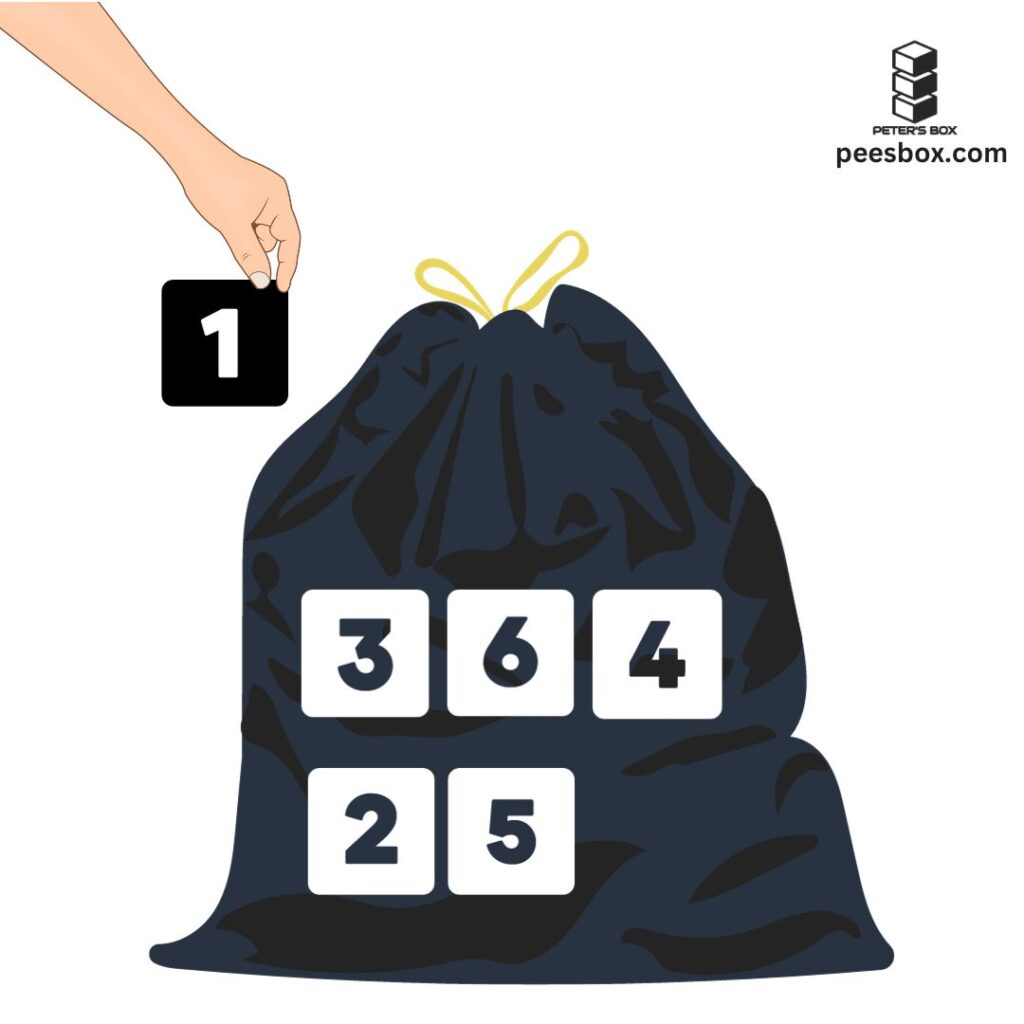
Problems with weighted lottery
You: What’s the problem?
Supervisor: I am a utilitarian.
You: How is that a problem?
Supervisor: Utilitarianism is the moral theory that the right (moral) action to take is the action that causes the greatest good for the greatest number of people. The mother and her four children make up the majority of the individuals in our scenario. As a result, instead of rescuing the man, the right decision is to rescue the mother and her children. The weighted lottery defeats the goal of utilitarianism. By using a weighted lottery, one person can be saved instead of five. All utilitarians will agree that this is not a morally correct decision.
You: Then you must agree that utilitarianism is unjust to the minority. Isn’t the man also a human? Let me ask you this: “Would you want your life to be taken into consideration if you were the man in the burning building?”
Supervisor: Of course!
You: Obviously. That consideration has been made possible by the weighted lottery, which gives you a chance to benefit from the action.
Low probability for minority does not mean impossibility
You: Besides, the chances of that one person in the minority being chosen out of the five are quite low. As a result, the weighted lottery should not disturb you too much. The minority has an extremely low chance of getting chosen.
Supervisor: Are you therefore admitting that the lives of the majority matter more than those of the minority? Also, the probability you refer to as low is not impossible or zero. What number did I pick? Wasn’t it 1? A low probability does not imply an impossibility.
You: Hmmm. I see.
Weighted Lottery is not enough
Your colleague, Edwin, jumps into the conversation.
Edwin: The weighted lottery does not really solve the problems of utilitarianism. It might solve the problem of unfairness to the minority, but it does not solve the potential evil acts that can be permitted under act utilitarianism.
You: How so?
Edwin: Do you recall the organ transplant dilemma in the blog post ‘Act Utilitarianism vs. Rule Utilitarianism‘ on Peter’s Box? Let me summarise it for you.
Organ Transplant Dilemma
In a hospital, there are five patients. They are all in desperate need of an organ transplant to save their lives. The doctor discovers that the on-duty nurse is a perfect match for the organ transplant. The nurse’s body contains the organs that these five patients need. Is it moral for the doctor to kill the nurse and harvest her organs to save the five patients?

Kantian Ethics - a competing moral theory
You: I think…
Edwin: According to utilitarianism, the proper action would be to kill the nurse and utilise her organs to save the lives of the five patients.
You: Hmmm, I see. However, Immanuel Kant would not agree with this action. His philosophy, presently known as Kantian ethics or Kantianism, would consider the utilitarian’s decision to murder the nurse to be immoral.
Edwin: Who is Immanuel Kant, and why would he disagree?
Keep an eye out for the next post to learn more about Kantian ethics.
What’s next in Peter’s Box? ¡Hasta luego amigos!


